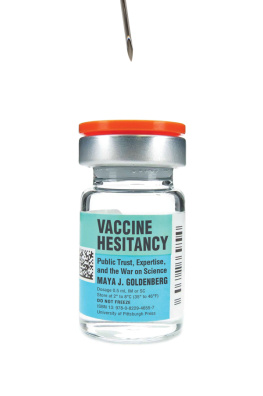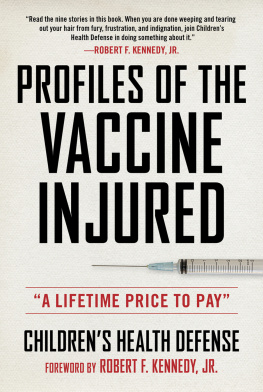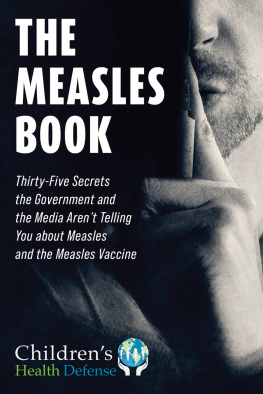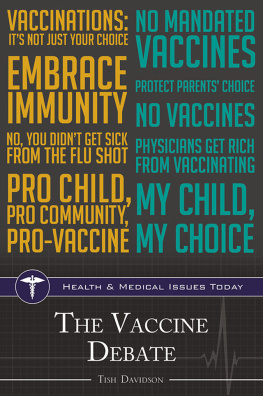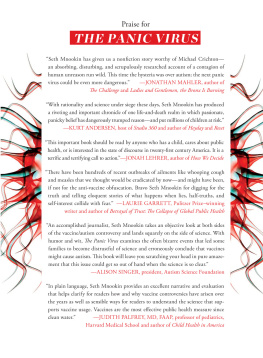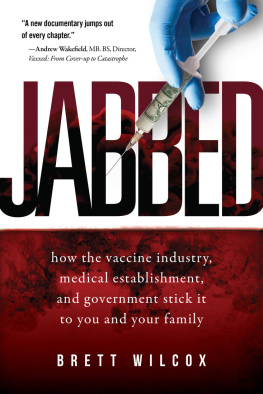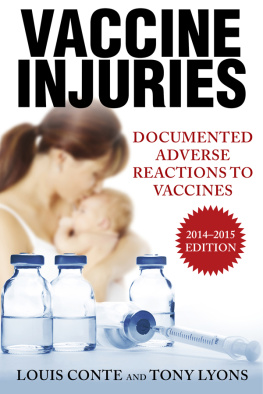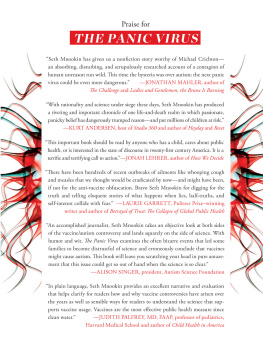Being in the midst of a crisis places limits on the ability to understand and evaluate its immediate and longer-term implications. This is a shared challenge for individuals and small and large institutions alike. We move forward with the best that we have and hope that it stands up through the storm. Rather than wait for clear skies as this crisis subsides, I have chosen to release this book with the hope that it can be used as a clarifying source for guiding next steps for public health, medicine, and scienceespecially in the drive for a safe and effective vaccine. Vaccine hesitancy and refusal will undoubtedly feature in yet unknown ways. There will surely be more to say as the pandemic progresses, but this book should be read within the context of understandable unknowns at this time.
ACKNOWLEDGMENTS
I remember reading the explosive investigative report exposing Andrew Wakefield for fabricating data in his infamous 1998 study linking vaccines to autism. The three-part report (Deer 2011a; 2011b; 2011c) had just come out, and like many readers at the time, I expected vaccine hesitancy to end right there. Yet vaccine hesitancy endured, and the frequency of measles outbreaks attributed to pediatric vaccine refusal by parents climbed in the years that followed. I wondered what evidence was going to convince people to drop this concern. As a philosopher of medicine working on how knowledge claims are constructed and justified in health care, I was in a good position to find out.
My first finding was that I was asking the wrong question, as I initially assumed that vaccine hesitators were missing some key scientific evidence that kept them from embracing the strong scientific consensus on vaccine safety and efficacy. But my research, which engaged science communications, sociology of expertise, public health sciences, behavioral sciences, social sciences, health equity scholarship, history and philosophy of science, health and science journalism, and qualitative research involving vaccine hesitant parents, enriched my understanding of the complexity of vaccine hesitancy. I developed an alternative thesis that I defend in this book; namely, that vaccine hesitancy is a problem of poor public trust. The solution lies in strengthening public trust in scientific institutions.
I want to acknowledge the wide and disciplinarily diverse research community into vaccine hesitancy that informed my philosophical investigation and analysis. These researchers span numerous disciplines and continents and brought many different findings, theories, and challenging perspectives to my attention.
I want to thank Mark Solovoy for encouraging me to take the first step in writing this book: contacting a few academic publishers to gauge their interest in a philosophy of science monograph on vaccine hesitancy. When four out of five publishers expressed interest in seeing a book prospectus, I felt encouraged to pursue this long research project, ultimately with guidance and patience from Abby Collier at University of Pittsburgh Press. Thanks to the Universityof Guelph and my colleagues in the Department of Philosophy and the Bachelor of Arts and Science Program for their support. I have many people to thank for reading drafts of the prospectus and book chapters, and for engaging me in interesting conversations. They include: Tara Abramson, Katie Attwell, Robyn Bluhm, Kirstin Borgerson, Matt Brown, Jim Brown, Shannon Buckley, Amy Butchard, Gideon Chemel, Ben Chin-Yee, Sharyn Clough, Lorraine Code, Michael Cournoyea, Sharon Crasnow, Colleen Derkatch, Michelle Driedger, Heather Douglas, Kevin Elliott, Carla Fehr, Jon Fuller, Patrick Garon-Sayeh, Jennifer Gibson, Daniel Goldberg, Devon Grayson, Kristen Intemann, Clara Juando-Prats, Sauvanne Julien, Nadine Laraya, Mark Largent, Heather MacDougall, Christopher McCron, Tara Mendola, Samantha Meyer, Mark Navin, Jamie Nelson, Kieran ODoherty, Daniel OQuinn, Janet Parsons, Jennifer Reich, Alison Thompson, Ross Upshur, and Pam Wakewich. There are surely more that I am neglecting to mention (with apology).
It is difficult to do this kind of intense work without the love and patience of my family. Special thanks to Gideon, Talia, and Lev. Also, my parents, Aviva and Andrew, my grandmother Edith, and my sister, Keren.
INTRODUCTION
VACCINE HESITANCY IN THE INDUSTRIALIZED NORTH
In January 2019 the World Health Organization (WHO) listed vaccine hesitancy as a top ten global health threat, sharing the distinction with known killers like air pollution, climate change, and population displacement due to conflict and war (World Health Organization 2019). the list incorporated both upstream and downstream causes of poor health. Some, like Ebola and dengue, are proximal causes of morbidity and mortality, while others, like fragile and vulnerable settings and air pollution, are upstream causes, or socially mediated determinants of health. Vaccine hesitancy stands out on this list of factors for negative health outcomes for being an attitude, as opposed to a pathogen or context. Indeed, despite a strong scientific consensus in favor of vaccines, vaccine hesitancy persists and impairs public health strategies for infectious disease control.
Vaccine hesitancy refers to an attitude of ambivalence regarding vaccines. It is distinct from vaccine refusal, which is a behavior. Vaccine hesitancy runs along a spectrum from mild to severe uncertainty about whether vaccines aresafe, effective, and necessary. While attitudes and behaviors are linked, vaccine hesitancy does not fully determine vaccine acceptance or refusal. When deciding on childhood vaccines, some hesitant parents will vaccinate according to the recommended schedule, some will refuse all vaccines, and others will pursue modified schedules. These alternative schedules might be selective, where children receive some vaccines but not others; temporally delayed, where children begin immunizations when they are older and the schedule is administered over a longer period of time; or some combination of both. Some parents seek to unbundle combination vaccines like the MMR (measles, mumps, rubella) or the MMRV (measles, mumps, rubella, varicella) in favor of separate vaccines for each disease administered over multiple healthcare visits rather than in one appointment.

